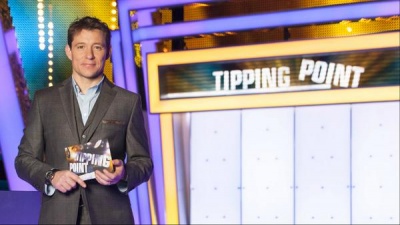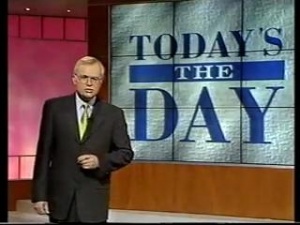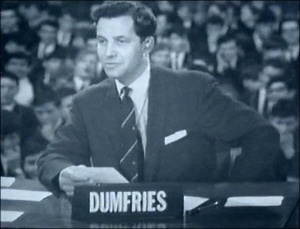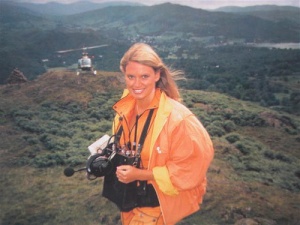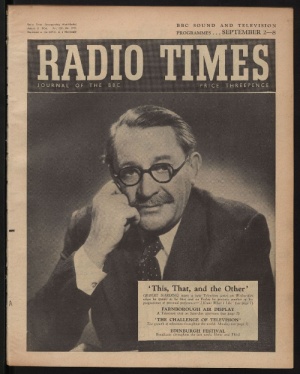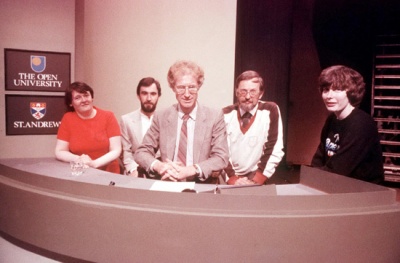Weaver's Week 2024-12-08
(Created page with 'Last week | Weaver's Week Index | Next week Our summer filler series continues, and begins to approac…')
Current revision as of 10:04, 8 December 2024
Last week | Weaver's Week Index | Next week
Our summer filler series continues, and begins to approach a conclusion. We're recording every game show to have had at least 500 episodes from 1924 to 2023, or at least 100 primetime episodes. Some near misses and interesting diversions on the way, too.
Contents |
Which game shows have the most episodes? Part 19: TIP-U
Tipping Point
Our older readers might remember those penny falls machines in seaside arcades: put an old penny in the slot at the top, time your drop to get a lot of shove, and you could win as much as thruppence. Tipping Point trades metal coins for sturdy plastic counters, pennies for £50, and has Ben Shepherd to host a gentle and undemanding hour of telly.
Tipping Point gets a lot of things right: the atmosphere is wonderfully supportive, the questions generally aren't too difficult, there's plenty of coin-into-slot action, and the format almost ensures a win or a reasonably close finish.
Piloted for a month in summer 2012, helped to do the dirty on Deal or No Deal, held down the 4pm slot for over ten years and only got elbowed aside by ITV's revival of Deal or No Deal. We reckon 1496 daytime episodes to the end of 2023.
Inevitably, there have been celebrity editions. Tipping Point Lucky Stars doubles the prizes and gives away the most useless Mystery Prizes imaginable: anyone for a Ben Shepherd toasting fork? 84 primetime episodes. Plus three Soccer Aid specials, two Text Santas, seven Christmas episodes. And they've chopped out some Best Ever Finals, which we're not going to count because they've got no new game content.
All of that gives a total of 1592 episodes.
Today's the Day
Gentle nostalgia quiz, where Martyn Lewis played black-and-white news and entertainment clips with some connection – often rather tenuous – to the day of transmission. One of the first shows to really exploit the BBC's massive archives, which involved two dozen pieces of paperwork for each half-hour transmission, and dubbing most of the clips onto the new computer playout system.
Ran from 1993 to 1999, a total of 753 episodes.
Top Club
Team quiz featuring clubs and organisations from across the North of Scotland taking part in an annual knockout tournament to find the Grampian region's Top Club of the year. Drew almost half the viewing audience, evidently people in northern Scotland care little for Terry Wogan's chat show.
Grampian shows have proven difficult for us to research, particularly with such a generic title as this (we keep bumping into irrelevant hits for Hamilton Academicals Nil and The Desperate Dan Fan Club). We believe the show ran for about 28 years, and it appears to have been 15 episodes per year, so we'll take a punt at 420 primetime episodes.
Top of the Form
Take the basic idea of Round Britain Quiz, the original travelling quiz incarnation not the cryptic show it evolved into, and apply it to schools. Grammar schools up and down the land received a visit from an authoritative figure like John Ellison, Tim Gudgin, or Paddy Feeny. Each school had a quizmaster in their own school hall, linked by the miracles of GPO circuits to hear each other.
The youngsters were asked questions about general knowledge, the school curriculum, improving leisure activities, and the like. There was a round asking the youngsters to pay attention to what they had just heard, and a "prepared passage" to study in the hour before the show.
The original radio series ran from 1948 to 1986, and made 628 episodes. We class radio shows made before the end of 1959 as "primetime", and Top of the Form has 211 primetime episodes – including the very last in the class, Stonehaven versus the Lycee Français at 7.30 on New Year's Eve night.
Almost inevitably, there was a television version; while Television Top of the Form gained zero marks for its original title, it was a properly rigorous quiz, tough and fair. 205 primetime episodes, mostly in the 6.30 family viewing slot the BBC let go in the mid-80s.
Grand totals of 833 episodes, and 416 primetime episodes. We would hope that there's space for a revival, let young people show the world what they can do, but the BBC seems reluctant to commission it (or maintain similar shows, like primary schools challenge Top Class, 80 episodes until the pandemic struck it down).
Top Town
"A friendly battle of entertainment" pitting such light ent stalwarts as Stockton-on-Tees against Ulverston, or Ashington against Bournemouth. Two professionals and a viewer pass judgement on a number of "turns" provided by the two competing localities, with the higher aggregate score declared the winner – and in some series a chance to return on a later show.
Music hall on your television screen, a blend of a familiar formula with unexpected elements. Top Town was the invention of producer Barney Colehan, who would be the hottest light entertainment producer in the north throughout his career.
Exactly 100 primetime episodes.
The Traitors hadn't qualified for our list by the end of 2023, having just 12 primetime episodes. At the current rate of Traitor reproduction, with spin-off Little Cloak and Celebrity Traitors and hairdressing advice on Parting Gift, it'll qualify sometime during the 2027 series.
Treasure Hunt (1)
A quiz played on Westward Television, with cash prizes of up to £100, and the Golden Galleon with its booty of bottletops. We've never seen an episode of this show, and quite clearly we're missing out, because it ran for 625 primetime episodes from 1961 to 1979.
But you're probably thinking of
Treasure Hunt (2)
Anneka Rice flies through the air with the greatest of ease, while Dominic and Geraldine Verynicepeople in the studio – nimbly assisted by Kenneth Kendall – solve cryptic clues to direct her journey.
As the show developed, it got much more ambitious – Anneka's asked to invade the stage, dive into the Jersey seas, abseil down into a Swiss waterfall. An absolute classic of television, ran from 1982 to 1989, with a too-brief revival in 2002-3.
97 episodes in the original series, 15 in the new-century revival. We are going to include two episodes made for the Thames and ITV Telethons, but not a Rice-and-Kendall reunion for The Krypton Factor (about 10 mins 30 sec in the video here), nor an affectionate pastiche as a beer commercial. 114 primetime episodes.
Treble Chance was another travelling programme, made in the Light Programme from 1962 to 1981. General knowledge, true-false, and spelling were the three types of challenge, and hosts included Brian Johnston and Des Lynam. About 325 episodes, which falls short of our benchmarks.
Turnabout with Rob Curling, a properly compelling word game. Fill in the blanks to make words containing BAR, and turn spheres on the board to form lines of your colour. Then they'd turn about the timer to make words containing RAB, and continue turning spheres.
And there was a massive pond in the middle of the studio. More shows need a massive pond in the middle of the studio. 239 episodes.
TV Scrabble
Toby Anstis (later Eamonn Holmes) hosted the Challenge channel programme, where four players were narrowed down to a daily winner, and four daily winners give us a weekly champion. Ran in the early aughts, and perhaps ripe for a low-budget revival. 103 primetime episodes.
24 Hour Quiz ran for 35 days on the various ITV channels, and had almost as many changes of rule. Richard Osman was the inventor, he went on to better things. Shaun Williamson was the host, and he went on to better things. Matt Brown was the late-night host, he (er)...
Twenty Questions
Gilbert Harding is thinking of something, and the panel have up to twenty yes-no questions to work out what he's thinking of. The answer is given to the studio audience by the producer holding up a card, and voiced for the audience at home by Norman Hackforth The Mystery Voice.
Ran from 1947 to 1976, other regular hosts included Kenneth Horne, David Franklin, Stewart MacPherson, Cliff Michelmore, and Terry Wogan.
We reckon there were 437 primetime episodes on radio before the end of 1959, a further 187 in the Home Service, and 190 on the new-fangled Radio 4. That's a total of 814 radio episodes.
Plus some short-lived television attempts: two eps in '47-'48, a run of 18 in '56-'57, and 23 for ITV in '60-'61, so 43 primetime television episodes.
The BBC says that Guess What? was a revised version of Twenty Questions, that made 10 episodes on Radio 4. If the BBC counts it, we'll concur. Any chance of a revival? Yes, but surely they can do better than a clichéd old format.
Anyway, 480 primetime episodes and 867 episodes in total.
Two Tribes split contestants into balanced groups, then asked general knowledge questions down the line. Ran for two series on BBC2 at teatime, accumulating 90 episodes. Misses out for two reasons: a) funded from the daytime budget and b) only 90 episodes. Still, good to see Richard Osman recovered from his earlier errors.
The Unbelievable Truth is the radio show where comedians deliver lectures full of bluff, bluster, and wild claims they've made up from the back of their hand. Except! Somewhere in their script are five facts: spot one and you could win points. Running on Radio 4 since 2006, but they only commission entertainment shows for a dozen episodes a year, so 177 episodes.
University Challenge
Two teams of four, general knowledge questions, heavily academic, host who has read English at Cambridge University. Gave us the phrase "starter for ten", demonstrated that "repêchage" has a place outside sport, and made an absolute star out of Bamber Gascoigne.
Ran on ITV from 1962 to 1987; as an educational show, it was generally buried in an off-peak weekend slot (this column associates it with the Sunday roast lightly burning, so the 1pm hour). Sean Blanchflower's excellent website has gaps on some of the match results, but shows 976 episodes.
A one-off edition in 1992 took UC to the Beeb, where a full series was commissioned from September 1994. It's still running, and notched up 1005 primetime episodes by the end of 2023. Then we consider Reunited (18 primetime episodes), The Professionals (61 primetime episodes), Christmas (127 episodes), and a Red Dwarf special.
And at the gong! The grand total is 2188 episodes, of which 1212 primetime episodes.
In other news
Roses d'Or were handed out at a ceremony on Monday night. Gladiators won the Studio Entertainment award, Taskmaster took Comedy Entertainment, and Squid Game: The Challenge claimed Reality Competition.
 Father Dougal, tree of temptation, van follower, Huddersfield's poet. Front: dummy laptop, 24 Hour Quiz devisor. (Remarkable)
Father Dougal, tree of temptation, van follower, Huddersfield's poet. Front: dummy laptop, 24 Hour Quiz devisor. (Remarkable)
A priest, a poet laureate, and two Big Brother housemates. Sounds like the setup to a joke: it's this week's lineup on House of Games (3). Richard Osman's successful teatime show has been on strong form this series, with a few loosely-themed weeks. Musical theatre with Michael Ball and Jodie Prenger was an early standout. Jay Rayner was self-effacing during his ruthless dominance of athletes Iwan Thomas and Fatima Whitbread. Cheryl Baker was tremendous fun, and Danny John-Jules is always worth the price of admission.
This week's group – Ardal O'Hanlon, Josie Gibson, Adele Roberts, and Simon Armitage – proved more adept than most at the unusual and surreal challenges. Wednesday's episode is a particular peach, with a new round getting the players to declaim "Anchovie Norwood Junction!" with all the excitement of a football commentator. Very much so!
Although we're still reading through our summer special, apparently the cold weather and shorter nights mean it's Advent, and some of our friends are doing clever things.
Jack Yeo has Wallvent, a long game of The Wall with lots of green and red balls. Find him on Bluesky.
Dealvent is a month-long game of Deal or No Deal, where we're trying to sell Box 13 for the most The Banker will offer. The top prize of £250k is still there, but the £100k went early. More at dealvent2024.com.
Puzzlevent, that's a cryptic crossword with clues released through the month for maximum frustration. Daniel Peake's to thank for this mental workout, and it's at puzzlevent.com.
Quizzy Mondays
Welcome to BBC Brain, where Jack Bennett is going to get the first question right (about Tom Hank's spheroid friend in Cast Away) and go on to score Five In a Row And a Bonus Mark. Alan Gibbs does well on his own questions, and picks up bonuses (including the Serenissimi, the Venice independence movement) to be just a point behind.
Just when Jack looks set to get another Five In a Row (etc), he's derailed by the location of UNESCO HQ. Helen Lippell puts together a strong run in the next round, then Alan Gibbs picks up to get close, and with bonuses tie the lead. Hannah Reilly makes a positive contribution to every round.
One for Jack in the final round, Alan gets one and two and three and that's the game. So Alan Gibbs takes the second place in the final, at the end of the month.
Roopam Carroll took victory on Mastermind, with The Matrix films as a specialist subject. Best of the specialist rounds, no better general knowledge set on the night, so a clear winner.
Cat Cows took another win over the Harmonics in the Only Connect qualification round. A stonking spot from the Cats on PROTE-(some letters) and a definition of the formed word; an entertaining no-score draw on sporty things lasting so many minutes, and a completely over everyone's head moment on the Guitar Hero computer game.
UCL were all over LSE in the latest University Challenge elimination match, winning 255-55. Josh Mandel again the standout buzzer, with Callum Jack and Sanjay Prabhakar making good contributions. The UCL side won on the buzzers; bonus rate of 62.5% tonight is not spectacular, and the side remains weak on Geography questions.
Four new episodes of The 1% Club on ITV (Mon-Thu), and more silly things on I'm Sorry I Haven't a Clue (Radio 4, Mon).
Finals of I'm a Celebrity... Get Me Out of Here! (VM1 and ITV, Sun) and The Rap Game (BBC3, Tue). Portrait Artist of the Year (Artsworld, Wed) finds its winner, as does Wales' Home of the Year (BBC1 Wales, Wed), and Masterchef The Professionals (BBC1, Thu). And, next Saturday, Strictly Come Dancing (BBC1).
To have Weaver's Week emailed to you on publication day, receive our exclusive TV roundup of the game shows in the week ahead, and chat to other ukgameshows.com readers, sign up to our Google Group.

